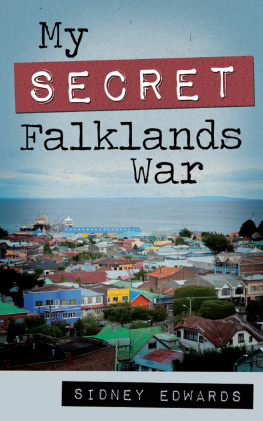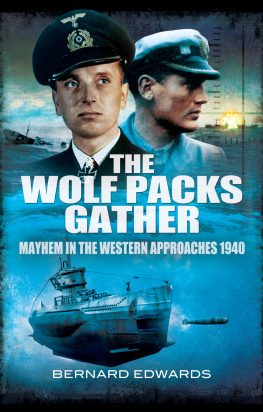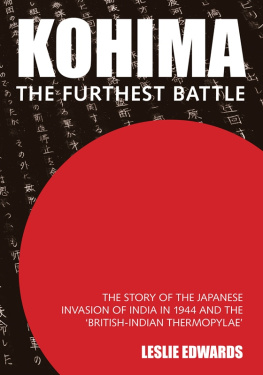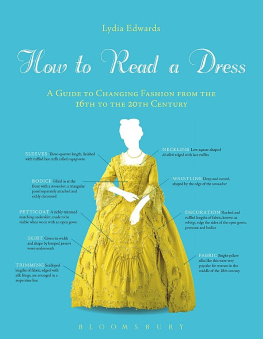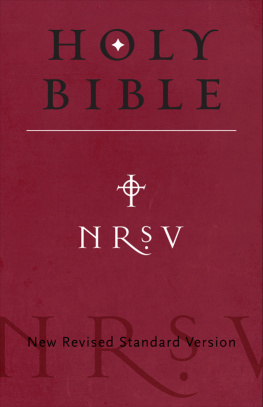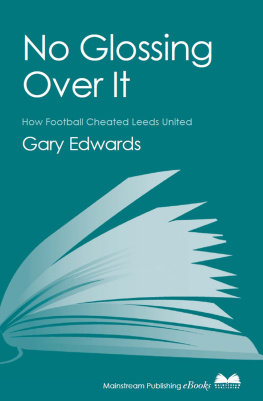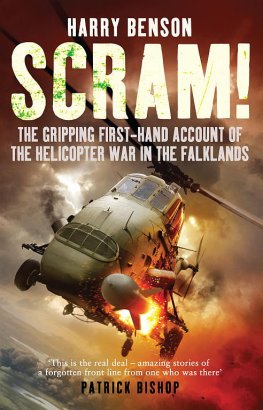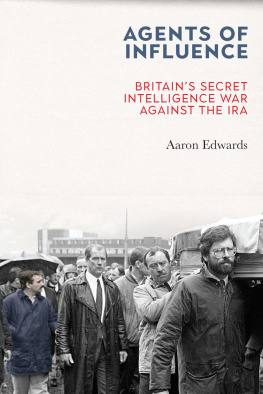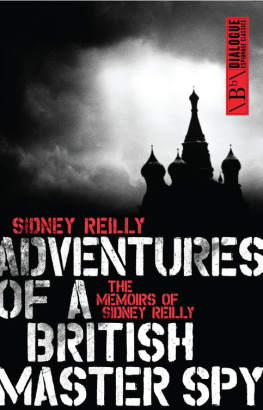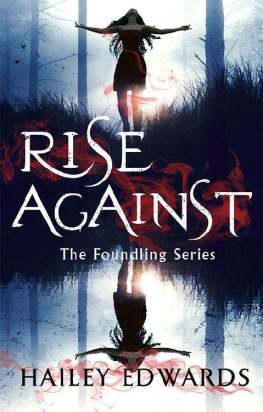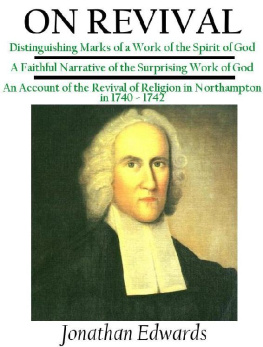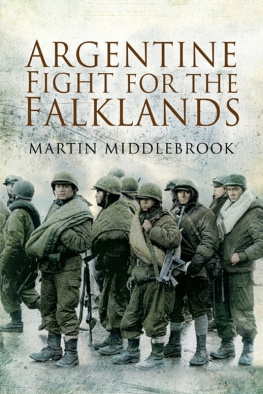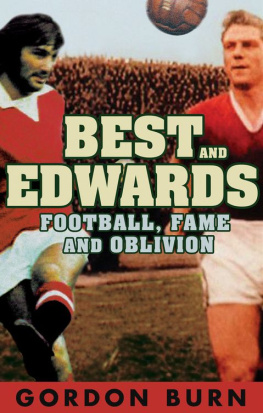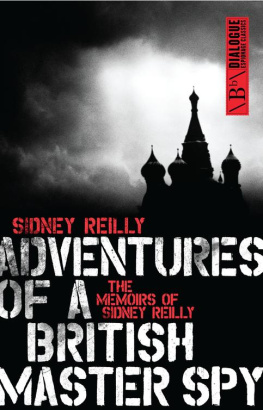About the author:
Sidney Edwards served in the RAF for 31 years, initially as a day fighter/ground attack pilot flying single-seat Hunter aircraft, and concluding his service as Group Captain, having been awarded the OBE, South Atlantic Medal and Queens Commendation for Valuable Service in the Air. As well as the clandestine mission described in this book, Edwards completed several tours as a jet instructor, served as Air Attach at the British Embassy in Madrid, and commanded advanced jet flying at the RAF Central Flying School, including the Red Arrows. His post-RAF career in civil aviation included being Managing Director of an air training college and ten years in key roles with easyJet. He lives in Letchworth, Hertfordshire.
MY SECRET FALKLANDS WAR
Sidney Edwards
Book Guild Publishing
Sussex, England
First published in Great Britain in 2014 by
The Book Guild Ltd
The Werks
45 Church Road
Hove, BN3 2BE
Copyright Sidney Edwards 2014
The right of Sidney Edwards to be identified as the author of this work has been asserted by him in accordance with the Copyright, Designs and Patents Act 1988.
All rights reserved. No part of this publication may be reproduced, transmitted, or stored in a retrieval system, in any form or by any means, without permission in writing from the publisher, nor be otherwise circulated in any form of binding or cover other than that in which it is published and without a similar condition being imposed on the subsequent purchaser.
Typesetting in Garamond by
Keyboard Services, Luton, Bedfordshire
Printed and bound in Great Britain by
CPI Group (UK) Ltd, Croydon, CR0 4YY
A catalogue record for this book is available from
The British Library
ISBN 978 1 909716 27 8
ePub ISBN 978 1 910298 22 0
Mobi ISBN 978 1 910298 23 7
To my wife Patricia, who died in December 2012, and to Ken Hayr, who was killed in an aircraft accident in June 2001. Their incredible faith and support sustained me during the most difficult yet exhilarating period of my Royal Air Force career.
Contents
Chapter 1
How long will it take you to get to Northwood?
About an hour, Sir.
Make it 45 minutes and Ill see you at the main gate; just follow my car in.
Yes, Sir.
The caller was Air Vice-Marshal Ken Hayr, Assistant Chief of Air Staff, Operations (ACAS-OPS), in the Ministry of Defence, London. It was Easter Sunday, 11th April 1982, just over a week after Argentinas surprise invasion of the Falkland Islands. I was then a Wing Commander working in the Ministry of Defence Sales Organisation in another part of London and living in a small village near Marlow in Buckinghamshire. When Kens call came through, I was mowing the lawn. RAF Northwood, north-west of London, was the Joint Force Headquarters for the operation to retake the Falklands.
I first met Ken Hayr when we joined the Royal Air Force together in 1954. He was a New Zealander and I was British. We trained as Flight Cadets on A Squadron, Number 69 Entry at the RAF College, Cranwell. This was a three-year course, during which we completed officer training together and gained our pilots wings on the Vampire jet aircraft. On graduation, Ken and I went to train as fighter pilots. We converted onto what was then the latest RAF jet fighter, the single-seat Hunter, at RAF Chivenor in Devon. This was a four-month course. Wethus knew each other very well as young men but after Chivenor were posted to different Fighter Squadrons and our paths crossed only occasionally during the rest of our RAF careers.
However, I had followed Kens subsequent career with great interest because my fellow 69 Entry Flight Cadets and I had always predicted that Ken was destined for very high rank in the RAF. He was proving us right so far and along the way had gained a reputation as a tough but fair leader with a very determined streak. I knew that if Ken wanted me at Northwood in a hurry on a Sunday morning, there must have been a very good reason and I had better get my skates on. I left the mower in the middle of the lawn, rushed upstairs to change into uniform and drove to Northwood as fast as traffic and speed limits allowed.
I reached the main gate at Northwood 43 minutes after Kens call, to find his staff car waiting. He waved and grinned at me from the back seat, indicating for me to follow, as the sentry opened the barrier and we drove through. After parking, we had time only for a quick exchange of salutes and a hearty handshake before we signed in at the entrance to the Headquarters. As we walked along the corridors, Ken apologised for spoiling my Sunday, saying that he would explain everything later but meanwhile we were expected at the briefing that was about to start. On entering the briefing room, I was impressed to see the large number of very high-ranking officers from all branches of the British armed forces. I recognised several of these distinguished military figures but I doubt if any of them recognised me! Apart from the Heads of the Royal Navy, Royal Marines, Army, Royal Air Force and Special Forces, there were many seniorspecialist officers from the operations, intelligence, engineering, medical and supply branches of all services.
There followed a comprehensive briefing on the current situation in the Falkland Islands, including the present and expected deployment of Argentine forces, not only in the Falklands but also in mainland Argentina. We heard that, while diplomatic efforts to persuade Argentina to leave the Falklands would continue, the Royal Navy had already prepared a Task Force that was sailing to the area. This action had three objectives. First, it would put pressure on Argentina by showing that we had the intention and the ability to recapture the Islands. Next, it would show the world in general and the Falkland Islanders in particular that we were not prepared to stand back and allow a military dictatorship to invade and occupy another country at will. Finally, and most importantly, if diplomatic pressure failed to dislodge the Argentine forces, it would give us the ability to carry out an amphibious assault, defeat the invaders and retake the Falklands. The briefing made clear that this would not be an easy operation. British forces would be operating at the end of an 8,000-mile supply chain in a very hostile environment, bearing in mind the extreme weather in the South Atlantic and the powerful opposing forces. The latter would have the considerable advantage of operating from their fixed home bases, with very short supply lines.
Conventional military thinking was that, in order to carry out a successful, opposed amphibious assault, an attacking force needed superiority in troop numbers of about three to one over the defenders. Given the time that Argentina would have to reinforce their troops on the Falklands while the Task Force sailed south, it was unlikely that we could achieve even parity in troop numbers.On the contrary, we would almost certainly be outnumbered by perhaps three to one, with the British invasion force estimated at the time as about 3,000 troops against an estimated Argentine garrison of about 9,000. Furthermore, to ensure an acceptable chance of success, we would have to achieve command of the sea as well as air superiority. This all added up to quite a tall order.
After a briefing on the likely disposition of our forces when the Task Force was in position near the Falklands, the meeting opened for general discussion and clarification. At this stage, Ken Hayr asked me to stand. He introduced me, explaining that within a few days I would deploy to Chile on special, covert duties. He said that I would report directly to him but would be available through him to any other commander who needed special assistance, physical or intelligence, throughout the build-up to and during any subsequent hostilities. He explained that I was a former fighter pilot with experience in the air defence and ground attack roles, which would both be crucial once the fighting started, that I had diplomatic and intelligence experience, held a current high security clearance and was a fluent Spanish speaker. He added that, for good measure, I had attended courses at the RAF Staff College and the National Defence College, giving me a good grounding in joint force operations. As the assembled top brass looked me up and down, I imagined they would be thinking that I was probably some sort of Walter Mitty type who thought he could win the war single-handed. I felt that some of them might take up Kens offer but only if they were desperate!

